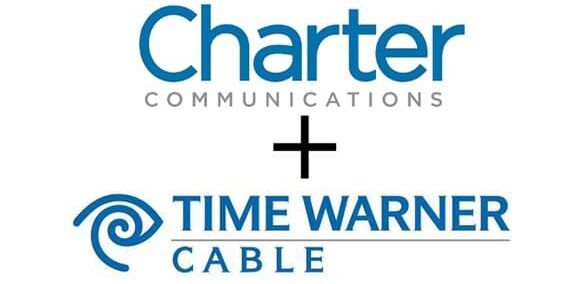
Charter Communication has announced its intent to buy Time Warner Cable, the second largest cable operator behind Comcast, in a deal valued at $78.7 billion. Charter also announced its plan to acquire Bright House Networks for $10.4 billion. The resulting deal will make New Charter (the merged company’s new name) a pay TV and broadband giant in the U.S., with 23.9 million cable subscribers in 41 states – a total exceeded only by Comcast.
New Charter will be led by Charter’s current CEO Tom Rutledge.
Rutledge declared that the merger would allow Charter “to accelerate the deployment of faster Internet speeds, state-of-the-art video experiences, and fully–featured voice products, at highly competitive prices.”
Rutledge has a history of pushing wireless services in the cable industry and this deal could lay the groundwork for a wireless network to challenge major mobile carriers. Until 2012, Rutledge was COO of Cablevision, where one of his major achievements was the launch of Optimum Wi-Fi, a network of wireless access points throughout the New York tri-state area. Rutledge has previously stressed the potential of using Wi-Fi as the backbone for a wireless network and earlier this year,Cablevision unveiled Freewheel, an inexpensive, Wi-Fi only, smartphone service for customers, relying solely on Cablevision’s 1 million-hotspot network for calls and data use. Not coincidentally, TWC and Bright House have extensive hotspot network offerings. They’re both part of the CableWiFi conglomerate, which bands together over 400,000 hotspots, built by five of the biggest cable companies throughout the U.S. and Charter has claimed it will build on their Wi-Fi efforts.
Charter says the mergers “will drive investment into the combined entity’s advanced broadband network,” resulting in “faster broadband speeds, better video products, including more high definition channels, more affordable phone service and more competition, for consumers and businesses.”
Charter’s bid comes one month after Comcast withdrew its $45 billion bid for TWC due to FCC regulatory concerns. The proposed merger would have left Comcast in control of 57% of the high-speed broadband market. At the time, FCC Chairman Tom Wheeler said the proposed merger would pose “an unacceptable risk to competition and innovation, including to the ability of online video providers to reach and serve consumers.”
Predictably, not everyone is enthusiastic about the proposed deal. S. Derek Turner, research director from the Advocacy group Free Press is skeptical about how the merger affects public interest, warning it could pose the same risks to Netflix and other online video providers as Comcast’s failed plan to merge with Time Warner. Turner says Comcast and New Charter could price broadband in a way that discourages consumers from watching OTT services like Netflix or Hulu – specifically by making unlimited data a thing of the past. He says, “If both Comcast and Charter were to impose strict usage caps, because they control collectively two-thirds of the market, they could kill the OTT video market in its infancy.”
Recent net neutrality rules prevent broadband providers from discriminating between Internet services, but they do not expressly prohibit them from eliminating all-you-can-eat pricing. The FCC has publicly stated that they will look at how – and whether – the deal benefits the public, and, importantly, whether data caps violate the net neutrality regulations on a case-by-case basis. FCC Chairman Tom Wheeler said, “The FCC reviews every merger on its merits and determines whether it would be in the public interest. In applying the public interest test, an absence of harm is not sufficient. The Commission will look to see how American consumers would benefit if the deal were to be approved.”
merger with TWC and Bright House, would result in New Charter having control of about 22% of the high-speed broadband market. Comcast already services 40% of that market, and so Comcast and New Charter would control more than six out of 10 U.S. home broadband connections. Charter was an original bidder for TWC last year until Comcast made their massive offer. Competition is heating up among cable and satellite providers as AT&T is also making a bid for DirecTV.







